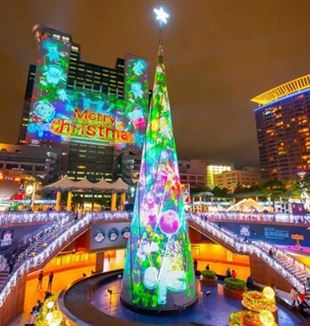
The light of Christmas in Taiwan
In Taipei, 24 and 25 December are working days. Few people know the meaning of the holiday, yet the city is illuminated by LED lights. A missionary of the Fraternity of St. Charles describes the hope that everyone has inside.Here in Taiwan, Christmas arrives as it did two thousand years ago: with almost general indifference. The 24 and 25 December are working days: there is no break that helps to remember the meaning of the holy birth of Jesus. This doesn't mean that there isn't a festive atmosphere: like in the West, it's a period dedicated to the exchange of gifts and shopping and the streets are decorated with many lights (the country is the world’s largest producer of LED lights). You can hear Christmas songs translated into Chinese. Walking around the streets of Taipei I thought: in the midst of all these lights, the Light is missing. The only light that really counts is the one that, next to the tabernacle, marks the presence of Christ in our midst.
The Chinese word for this feast day can be translated as "the feast of birth", and it is normal for people to say that it is Santa's birthday. At best, they say it is Jesus’ birthday. In any case, it’s a memory of something from the past.
In reality, everyone, even here, is waiting. Even if they don't know it. To indicate the night of the 24th, Taiwanese Catholics use an expression that can be translated as "night of peace". The Chinese character used is one they usually use to greet each other, to wish each other a good journey and good health. "Peace", in the sense of security, but also peace of the heart. Everyone is waiting for this peace. However, in some people, this awaiting becomes conscious. This peace awaits the 99% of the Taiwanese population that knows nothing about Christianity, and it awaits the 1%, for which this is an occasion to think about the mystery of the Incarnation.
For this reason, a typical Christmas tradition of the Taiwanese Christian communities, both Catholic and Protestant, is called 'announcing the good news'. One goes out into the streets of the city, announces the birth of Jesus and invites people to attend Christmas Mass. We too did it on Sunday. It is a small gesture whose outcome is difficult to evaluate. Yet it is a precious occasion for Christians to recognize each other, thanks to the presence of Christ, and to share this friendship with those who pass through the streets.
What has surprised me positively this year is that more Catholics than last year have asked for holidays during this period. The end of the year is a crucial time for companies, and it is almost forbidden to stay home from work. The other day, a friend intervened at School of Community saying: "For the first time, I felt free to go to my boss and ask for vacation time". This is anything but obvious. It is a gesture from which one can really see the expectation of what is about to happen: this expectation for Christ changes one's life and one wants to stay at home with one's family instead of working, as everyone would have done.
The other thing that helps me these days is to look at another parishioner who was baptized four years ago. She has been very ill for some time and she is constantly going in and out of hospital. Her life is marked by the unpredictability of her illness. I am struck by the radicality I see in her, with which she is waiting for Christmas: I see it in the dialogue with her and in the way in which she participates in the gestures we propose (we did a Christmas retreat where the theme was that of the Christmas poster, the story of the Unnamed). But I am also amazed by her desire to share the joy she experiences, even in the drama of the deterioration of her illness. I see how she is giving herself, giving all her energy for the Church, the parish, the movement. I see how she insists on giving us gifts. In her, you can see the certain joy that everything in her life is saved.
Here, the story of the movement is right at its beginning and we need to explain to people what it is. For example, some time ago, we explained to some people what the Fraternity is and we said that if they wanted, they could apply to join. When this woman heard what it was about she did not hesitate for a moment and applied. Therefore, she too was at the dinner we had the other night in Taipei, for the members of the Fraternity. There were twelve of us. It was a very simple moment and she was very happy. When she came home she wrote to me: "I am truly grateful because Christ is present in my life through this friendship.” There, I understood her confidence in asking to enter the Fraternity. Her joy, within her illness, is truly a sign of how Christ, coming into the world, changes our lives and gives us peace.